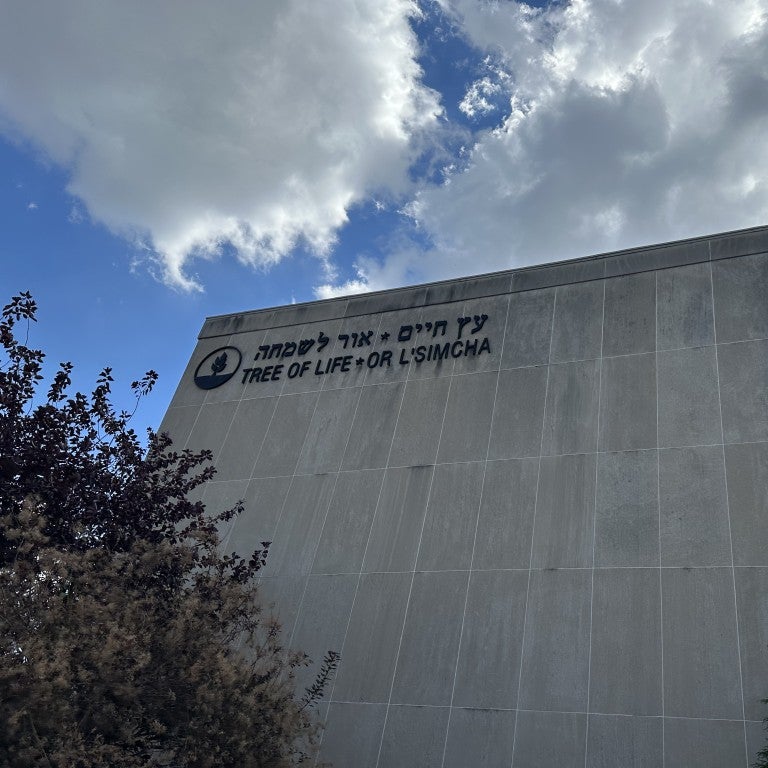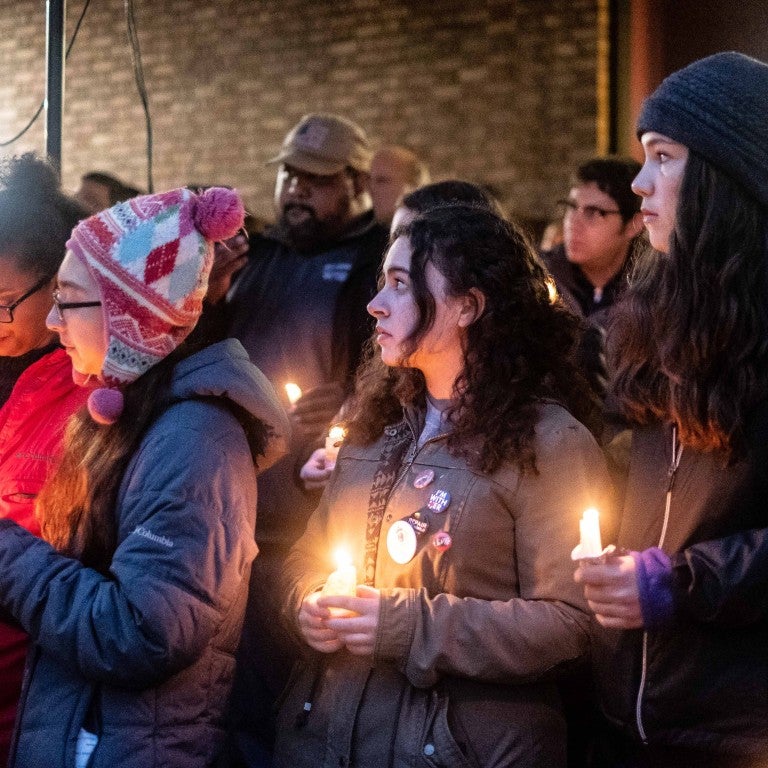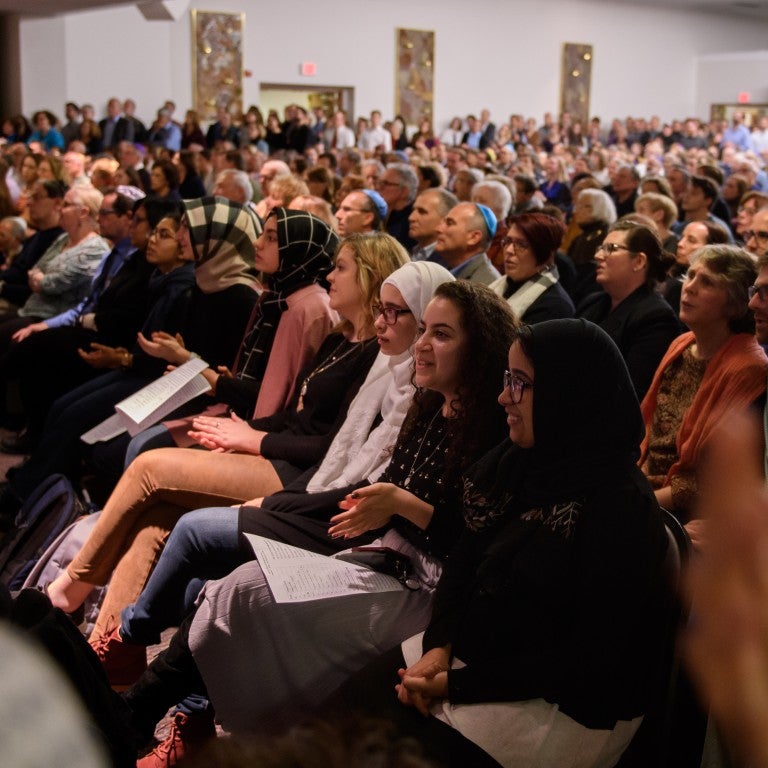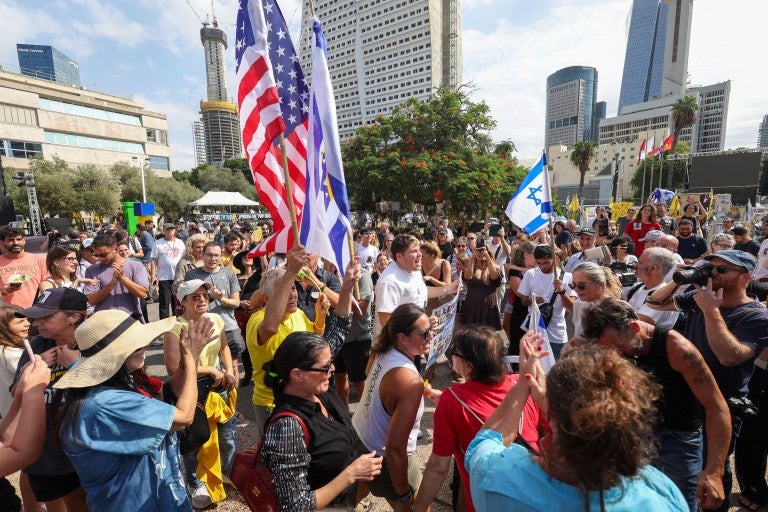April 4, 2024
Listen to this compilation of our award-winning series Remembering Pittsburgh, exploring how the horrific shooting at the Tree of Life synagogue affected the Jewish community in Pittsburgh, the U.S., and around the world. In the four-part series, we take listeners behind the scenes of how the Pittsburgh Jewish community continues to rebuild and honor the lives lost on October 27, 2018.
The anniversary came during the same month as the most lethal attack on Jews since the Holocaust: Hamas' October 7 massacre of Israelis. Rising antisemitism has led to the murder of Jews around the world, from Pittsburgh, to Paris, to Israel. All forms of antisemitism must be countered to ensure a safe and secure Jewish future.
Listen to the entire series at AJC.org/TreeofLife.
*The views and opinions expressed by guests do not necessarily reflect the views or position of AJC.
Episode Lineup:
- (0:40) Eric Lidji, Carole Zawatsky, Howard Fienberg, Marnie Fienberg, Belle Yoeli, Anne Jolly, Ted Deutch
Show Notes:
Music Credits:
- Relent by Kevin MacLeod (incompetech.com), Licensed under Creative Commons: By Attribution 3.0
- Virtual Violin Virtuoso by techtheist is licensed under a Attribution 4.0 International License
- Tree of Life by Nefesh Mountain
- Shloime Balsam - Lo Lefached
- Hevenu Shalom - Violin Heart
Listen – People of the Pod on the Israel-Hamas War:
- Jewish College Student Leaders Share Their Blueprint for Combating Antisemitism
- Matisyahu’s Message to His Fellow Jews and to the Israel Haters Trying to Cancel Him
- Unheard, Until Now: How Israeli Women Are Powering Israel’s Resilience
- 152 Days Later: What the Mother of Hostage Edan Alexander Wants the World to Know
Follow People of the Pod on your favorite podcast app, and learn more at AJC.org/PeopleofthePod
You can reach us at: peopleofthepod@ajc.org
If you’ve appreciated this episode, please be sure to tell your friends, and rate and review us on Apple Podcasts.
Episode Transcript:
Manya Brachear Pashman: Last month, the Senate earmarked $1 million in federal funding to create a curriculum for students about antisemitism and other forms of discrimination and bigotry. The recipient of that money? An organization that knows the consequences of that hatred all too well: the newly imagined Tree of Life, an education center dedicated to ending antisemitism that emerged after 11 worshipers inside Tree of Life synagogue were murdered by a white supremacist on October 27, 2018.
This week, we are presenting a compilation of our award-winning series Remembering Pittsburgh, which launched on October 5, 2023 -- right before the October 7th terrorist attacks in Israel.
Listen to the series at AJC.org/TreeofLife.
__
Episode 1, which originally aired on October 5, takes you inside the Tree of Life building before it was demolished to make way for a new complex dedicated to Jewish life and combating antisemitism.
Eric Lidji: Pittsburgh definitely is not forgetting. It’s ever-present here. There are people who are healing and doing so in ways that, at least from the outside, are remarkable and very inspiring. And there are people who I'm sure have not fully reckoned with it yet.
Carole Zawatsky: It's all too easy to walk away from what's ugly. And we have to remember. We can't walk away.
Manya Brachear Pashman: Five years have gone by since the horrific Shabbat morning at Pittsburgh’s Tree of Life Synagogue, when eleven congregants were gunned down during prayer – volunteers, scholars, neighbors, doing what they always did: joining their Jewish community at shul.
Today, we take you to the Tree of Life building that stands on the corner of Shady and Wilkins Avenues in Pittsburgh’s Squirrel Hill neighborhood to hear from two people in charge of preserving the artifacts and memories of the vibrant Jewish life that unfolded inside those walls until October 27, 2018.
Manya Brachear Pashman: In early September, our producer Atara Lakritz and I visited the Tree of Life synagogue in Pittsburgh’s Squirrel Hill neighborhood. Squirrel Hill, where Jews have settled since the 1920s, is quite literally Mister Rogers’ neighborhood. We were there to interview those touched by the events of October 27. But it didn’t take us long to figure out that everyone there had been affected in some way.
All along Murray Avenue, in 61C Cafe, at Pinsker’s Judaica Shoppe, at the Giant Eagle supermarket, when we told people why we were there, they all had a story, an acquaintance, a connection.
Later, walking through the glass doors of the synagogue felt like we were stepping through a portal, traveling back five years, when life stopped, and the reality of the hatred and terror that unfolded there began to haunt every step.
Atara and I were invited to accompany a final group tour of the building before it closed in order for preparations to begin for the building’s demolition. The tour was painful, but we felt it necessary to share with our listeners.
As we left the lobby, we were told to take the stairs to the left. The stairs to the right were off limits. Someone had been shot there.
We were led to a small, dark storage room where chairs had been stacked for guests. A handful of people had hidden there as the shooter continued his rampage, but one man walked out too soon, thinking it was safe. When first responders later came to get the others, they had to step over his body.
In the kitchen, there were still marks on the wall where the bullets ricocheted when he shot two women hiding underneath a metal cabinet. The calendar on the wall there was still turned to October 2018 with a list of activities that were happening that week posted alongside it.
And in the Pervin Chapel where seven people died, pews punctured with bullet holes and carpet squares stained with blood were no longer there. No ark either.
But remarkably, the stained glass windows remained with images and symbols of Jewish contributions to America, the land to which the ancestors of so many worshipers once inside that synagogue had fled to and found safety. Those windows will be carefully removed by the son of the man who first installed them 70 years ago. And they will return, when the reimagined Tree of Life rises again.
Carole Zawatsky: The tragedy is a Pittsburgh experience. But it's also every Jew’s experience. It shattered for so many of us our sense of security in America. This is our safe haven. This is where we came to.
Manya Brachear Pashman: Carole Zawatsky is the inaugural CEO of the reimagined Tree of Life. Since November 2022, she has overseen the development of a new complex on the hallowed ground: an education center dedicated to ending antisemitism, including a new home for the Holocaust Center of Pittsburgh; a memorial to the lives lost that Shabbat morning; a dedicated synagogue space where the Tree of Life congregation can return.
Carole Zawatsky: What can we build to enrich Jewish life, to remember this tragedy, and to show the world that we as Jews should not be known only by our killers and our haters, we should be known by our joy, our celebrations, our rituals, our resilience.
__
Manya Brachear Pashman: Next, hear from the son and daughter in law of Joyce Fienberg, one of the 11 victims. In this second installment of our series, we sit down with Joyce's son, Howard Fienberg, and his wife, Marnie, as they share their journey of mourning and resilience.
After her husband and mother died in 2016, Joyce Fienberg started each day at Tree of Life synagogue in Pittsburgh, to recite Kaddish, the mourner's prayer. Even when she was no longer officially considered a mourner as Jewish tradition prescribes, 11 months, she continued to attend services each morning at the synagogue.
That's why Howard Feinberg knew his mother Joyce was at Tree of Life when he heard there had been a shooting there on the morning of October 27, 2018. It would be more than 12 hours before he learned she was among the 11 killed that day.
Howard and his wife Marnie are with us now from their home in Northern Virginia.
Howard, you followed your mother’s example and recited kaddish for 11 months. Can you tell us a little bit about that experience? That experience of saying Kaddish and mourning for your mother, and also can you share with our listeners why it felt like the mourning period was extended?
Howard Fienberg: I felt a huge amount of support everywhere I went, in order to be able to say Kaddish every day. Which for someone who was not the most observant of Jews, it was a big lift to be able to do that every day. In fact, even when traveling in disparate places, that I could always find, somehow, be able to pull together 10 people to be able to say Kaddish was a big deal. And I wanted to make sure that no one would struggle in similar circumstances as well.
Obviously, initially, in Pittsburgh putting together 10 people was not a particularly big lift. Because the community support in that first week of Shiva was phenomenal. But it's not an easy thing in many congregations, and I think we are fortunate in mine that we always seem to pull it out every day. But I want to make sure that it happens. So in practice wise, that's one of the biggest things, my involvement with the synagogue, and prayer.
The broader extension of the mourning period, in a way, was a result of the constant delay of the trial for the monster that committed the massacre. And that was a result of both just the general usual procedural delays that you would expect, combined with COVID excuses that dragged things out during the trial. And once a new judge took over responsibility for this case, things suddenly snapped into gear and it moved forward. And we're particularly grateful for the judge in this case, just for his very no-nonsense approach moving forward.
Manya Brachear Pashman: Can you talk about whether the guilty verdict once it did take place, and a verdict was delivered, how that verdict changed anything for you and your family?
Howard Fienberg: It was a matter of relief, to a great extent. I sat through almost the entirety of the trial, heard and saw all of the evidence. A lot more than I expected to and ever wanted to, but I felt duty to do so. From an outside perspective, looking at it all, you would say this is a slam dunk case, lined up for all the federal hate crimes that were involved. And at the same time, I was in doubt until the jury came back and said, all said guilty. It's just the nature of things. I was on pins and needles. Massive relief afterwards and the same thing with the final verdict and sentencing. Massive relief for us and our families.
And that did allow…nothing's ever closed. You don’t finish feeling the loss of somebody, especially when they're taken in, you know, horribly violent terrorist circumstances. But you move from segment to segment. So the same as we do in the year of mourning, you're moving from shiva, which is one kind of thing, to the 30 days, and then to the end of the mourning period. And this was moving to yet another period. And what exactly this is and how long it will be, I don't know. But we're figuring that out as we go. I certainly feel a lot more relaxed.
Marnie Fienberg: Feels a little lighter.
Howard Fienberg: Yes, definitely lighter.
Manya Brachear Pashman: That's good to hear. That's good to hear. I am curious, you said you felt a duty to listen to those details, even though you didn't want to. Can you explain why you felt that sense of obligation?
Howard Fienberg: Part of it is, somebody in our family needed to. And it wasn't something that I wanted everybody to sit and hear and see. And I specifically told friends and family as much as I could, to stay far away and said, as much as you want to know, I'll let you know. But otherwise, it's horrific. And it wasn't anything that I would wish for anybody to see and hear. But at the same time, it's the reality of how my mom died. And what the circumstances were, what was going on with the antisemitic conspiracy theories that drove the monster that killed her. And what did he have in mind, and what was his intention, what did he plan, what did he do? These were important things.
And the bigger picture, which I didn't even know going in, was the extent to which the police in Pittsburgh were so heroic. And while they were not able to save my mom, they saved other people, including friends of ours, and people who are now friends, who would not be alive if those cops had not tried to charge at the front door trying to charge the building and getting shot.
And then the SWAT teams going into the building, and in a couple cases getting almost murdered themselves, trying to rescue the people that were inside. And they did rescue some people. And those people would most likely be dead if the SWAT had not rushed in. Equipment wise, they were not ready ordinarily for this sort of situation. But they went in anyways because they knew they needed to, and they didn't hesitate. And that's the kind of thing that you can only understand, having gone to the trial and learned what went on.
___
Manya Brachear Pashman: In the third installment, we look back at how horror drew people to solidarity. We interviewed Belle Yoeli, AJC chief advocacy officer, as well as others who showed up for Shabbat.
Belle Yoeli: We saw hundreds of thousands of people show up. And we saw pictures later, after the fact, and videos, and people making speeches, and just so much solidarity. This was captured on the news. I think it really stands out as one of the most amazing responses to antisemitism that we've seen in modern history.
Manya Brachear Pashman: On October 27, 2018, Americans witnessed the deadliest antisemitic attack in this nation’s history. The senseless slaughter inside a house of worship devastated and shocked American senses because it was simply unAmerican. But the aftermath of the atrocity became an American moment when so many people showed up – showed up with hugs, showed up with flowers, showed up with prayers for their Jewish neighbors.
The most visible expression of this came a week after the massacre with the unprecedented turnout of people of all faiths at synagogues across the nation as part of AJC’s #ShowUpForShabbat campaign. Together, Americans sent a message that hate will not prevail.
Belle Yoeli: Everyone wanted to do something, and the entire Jewish community mobilized to make this happen with the understanding that as AJC has always said that antisemitism is not just about the Jewish community. It starts with the Jewish community, but it's a threat to democracy, and the murder of Jews in their religious institution is such a breaking, a fracturing of everything that the United States stands for, everything that democratic society stands for.
Manya Brachear Pashman: Today, Belle Yoeli is the chief advocacy officer for AJC. In 2018, she worked as the chief of staff for then AJC CEO David Harris. David had spent nearly 20 years counseling European leaders on the rise of antisemitism in their midst, calling their attention to violent crimes against Jews when conflict erupted between Israel and their Arab neighbors.
Belle was on her way to a nephew’s birthday party when she got the call on October 27 about what had happened in Pittsburgh. She remembers sobbing in the car on the phone with colleagues as they all grappled with the reality that whether they were regular shul-goers or had just happened to go to synagogue to celebrate a friend’s bar mitzvah that day – it just as easily could’ve been them. For many, what they needed now was to go to shul and not be afraid, and to see others, not just their own community, but others of all faiths in the pews alongside them. What they needed most now was to know they were not alone. So they drew up a plan.
Belle Yoeli: A couple members of our staff actually kind of simultaneously came up with a similar idea, which was that we need to, more than anything, rally non-Jews to come and support the Jewish community at this time, and what better time to do that than the following Shabbat.
Manya Brachear Pashman: Dubbed #ShowUpForShabbat, the social media-based campaign called on both Jews and those of other faiths to flock to synagogues that coming Shabbat on the weekend of November 2 in support of the Pittsburgh Jewish community and all of American Jewry. The response across 80 countries was astounding.
Manya Brachear Pashman: We connected with people who showed up that Shabbat five years ago, and ask them what the experience meant to them.
Anne Jolly: An important part of what we proclaim is love God, love your neighbor, change the world. And so we believe that means, we show up for each other. We can't love each other without being present with each other. So we have to be together. You have to show up.
Manya Brachear Pashman: Episcopal Bishop of Ohio Anne Jolly was serving as the rector of St. Gregory Episcopal Church in Deerfield, Illinois in October 2018. A former hospital chaplain, she was sitting in her office when she heard the news break that Saturday morning. Her first call was to her friend and colleague Rabbi Karyn Kedar down the road at the Reform temple commonly known as Congregation BJBE. Rabbi Kedar had recently preached at St. Gregory and then-Pastor Jolly was scheduled to deliver the guest sermon at BJBE the following Friday night.
Anne Jolly: I called her and we talked and we prayed. And I said to Karyn, I think probably you need to preach on the Shabbat following the shooting at your temple and she said, ‘I want you to do it.’ She said ‘I think I think we need to hear your voice and that the congregation needs to hear you.
Rabbi Kedar I think thought that to hear a voice of someone who is not Jewish saying aloud, We love you, we care for you. We believe we are all created in God's image together. And that means we need to show up for each other. It means we need to be present with each other, that to hear that from someone who was not part of their community might be more powerful, more impactful, and more important for the community here at that time.
Manya Brachear Pashman: When Bishop Jolly arrived that following Friday she did not expect her sudden sense of fear when she encountered armed guards.
Anne Jolly: I didn't realize I was afraid until I walked in the door. And I stopped and had to take a deep breath and realize that I was afraid because I was entering into a space of people who have long been afraid. And that I had never had to experience that before in that way. And I wasn't really afraid for my congregation the same way I was for my beloveds in the synagogue, that they had more of a reason to be afraid than I did. And that was all the more reason for me to be there, and to be present with them.
Manya Brachear Pashman: Bishop Jolly credits that night at BJBE for the deep connection that formed with the congregation. In fact, she returned to BJBE many more times to celebrate Shabbat. Precisely a year later, the members of the Jewish congregation showed up at her door after a pumpkin patch at St. Gregory had been destroyed by vandals.
Anne Jolly: There were a bunch of them that came to our patch and we were talking about it and they said, ‘We just wanted to show you that we are supporting you. And they were worried that that vandalism had been an act of aggression against us. And I just thought it was kids. And that was a really clear distinction of how our worldviews are different. For them, a vandalism thing would, of course, of course, be something hateful against them. In this case, it was children, it was just teenagers being dumb. But it reinforced that understanding that for them, fear is always in the background because of the violence perpetrated to them – again and again and again.
___
Manya Brachear Pashman: For this closing episode of the series, I sat down with AJC CEO Ted Deutch, who served as a congressman at the time of the Tree of Life massacre. We discussed this anniversary and its parallels to the October 7 attack on Israel, when once again Jews were murdered just for being Jewish.
Ted, where were you on the morning of October 27, 2018 when you heard about the Tree of Life?
Ted Deutch: I was a congressman who represented Parkland, where the mass shooting at Marjory Stoneman Douglas took place. And the morning of Tree of Life, I spoke to a group of high school students from all around South Florida, who participated in a program about how they can become leaders in the community. I spoke with them about what had happened a few months before in Parkland, and what I had seen from high school students in Parkland and how they responded and how you stand up to violence and try to stop it and how you respond to evil and how important it is to use the power that you have as young people. That was literally what I was doing right before I walked out of the Florida Atlantic University auditorium and saw my phone start to buzz with news of Tree of Life.
Everything that I had said to the students in the discussion, that really difficult conversation we had with these students who shared with me their fears of violence, their fears of going to school–those fears hit home really hard for me and for the Jewish community.
Manya Brachear Pashman: So in our first episode of this series, our producer Atara Lakritz and I went on the last tour of the Tree of Life building. You also walked through the building back in June, before many of the artifacts had been removed. Would you mind reflecting on that experience?
Ted Deutch: I couldn't help but think of my synagogue where I grew up on the other side of Pennsylvania in a lovely community, like Pittsburgh. I was struck that, forget that this was a synagogue, I really couldn't stop thinking that it was inconceivable that that kind of horrible tragedy could happen in a community like that.
And walking through the synagogue and seeing the site where hatred, and antisemitism, and manifestations, the worst manifestations of antisemitism were brought to this lovely place, in this wonderful synagogue. It was overwhelming to think about what was happening that Shabbat and the fear and terror that people felt as that was happening. That was number one.
Secondly, I walked into the main auditorium where they were gathering all of the things that hadn't yet been taken away to be used in the museum and the memorial that's going to be constructed, that haven't been given back to families.
There were lots of things that are just not identified, they don't have families to return them to. And to see tallaisim and tefillin and all kinds of items that are used for Jewish rituals and Jewish customs just sitting on this table where they didn't know what they were going to do with them because the synagogue that existed there, the life that existed there, that simple, wonderful community, that was gone. It was gone.
That community will never be the same. And I think for our community, for the Jewish community, we're really never gonna be the same after what happened there.
Manya Brachear Pashman: You were telling me before we started this conversation that they gave you something during your visit.
Ted Deutch: As I walked through, and they saw how moved I was by this massive display. They came over and made such a kind gesture to me. And of all of the gifts that I've received in all of my travels, as a member of Congress, and now as CEO of AJC, I don't think there's anything that’s as meaningful as the tefillin that they gave me.
I don't know, obviously, I don't know whose it was. And it may well have been someone that was a synagogue member years and years ago. But the connection that I felt at that moment to that community at Tree of Life and the connection that I felt thinking about, not just Tree of Life, but tragedies that have befallen the Jewish people throughout our history.
And knowing that I was going to return to New York, I was going to have the opportunity to join the Jewish community around the world in overcoming these tragedies, and making sure the world understands why these kinds of attacks will never, they'll never work, they'll never, they'll never defeat the Jewish community. As we endure this really challenging time now in Israel, I've been thinking the same thing.
We've gone through a lot in our history, and we've constantly, constantly overcome, and have grown and have learned and have continued to enrich the world. As Tree of Life rebuilds and will help shape a national and international conversation for years to come about fighting antisemitism. And as we continue to do our work and as Jews around the country and around the world go through whatever security measures they have to to go to synagogue and to drop their kids at day school and Hebrew school and for people to show up for programs at the JCC, there is a defiance that I felt at that moment that is perhaps the most important thing I took away from that day.
Because it was awful. But I'm not going to dwell on how terrible it was. We're going to think about every way we can to honor the memories of the lives that were taken, and to strengthen the Jewish people in their memory as we go forward.
Manya Brachear Pashman: We planned this series and invited you to speak before the October 7th terrorist attack in Israel and the war with Hamas that has unfolded since. At first we wondered whether we should even proceed with this series. How could we focus on anything other than Israel at this moment? Of course, the parallels between the Tree of Life and October 7th are all too stark– Jews are once again being targeted simply because they are Jewish. Can you share your thoughts on this difficult moment for the Jewish people?
Ted Deutch: That sense of unease that all of us felt when we heard that story, like how could that possibly happen in the United States, really, it's an unease and fear that we feel when we've watched what's happened in Israel and when a horrific and brutal and barbaric attack takes place against our family, our brothers and sisters in Israel, we feel that here, and especially when it was, it was unthinkable what happened with this Hamas attack. Just as somebody shooting up a synagogue was unthinkable in America, it again, it puts us on edge, and it makes us redouble our efforts. Not just to fight antisemitism, but to really bring the community together.
What I've really been proud of since this terrible time in Israel began is the way that AJC has responded, not just in putting out meaningful information to help people get the facts and get through this, and to fight back against lies. But the way that we've really worked to bring the community together.
There are 16 million Jews in the world, out of eight and a half billion people we need to stick together. Moments like Tree of Life remind us of that, and what's been happening in Israel absolutely reminds us of that. That informs so much of what AJC does, and has done in response to Tree of Life and certainly is doing in response to the current situation.





